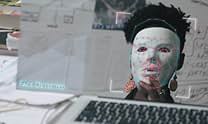Aggiungi una trama nella tua linguaWhen MIT Media Lab researcher Joy Buolamwini discovers that facial recognition does not see dark-skinned faces accurately, she embarks on a journey to push for the first-ever U.S. legislatio... Leggi tuttoWhen MIT Media Lab researcher Joy Buolamwini discovers that facial recognition does not see dark-skinned faces accurately, she embarks on a journey to push for the first-ever U.S. legislation against bias in algorithms that impact us all.When MIT Media Lab researcher Joy Buolamwini discovers that facial recognition does not see dark-skinned faces accurately, she embarks on a journey to push for the first-ever U.S. legislation against bias in algorithms that impact us all.
- Regia
- Sceneggiatura
- Star
- Premi
- 3 vittorie e 6 candidature totali
- Self - Author, Weapons of Math Destruction
- (as Cathy O'Neil Ph.D.)
- Self - Author, Twitter and Tear Gas
- (as Zeynep Tufekci Ph.D.)
- Self - Author, Automating Inequality
- (as Virginia Eubanks Ph.D.)
- Self - Technical Co-Lead, Ethical A.I. Team at Google
- (as Timnit Gebru Ph.D.)
- Self - Author, Algorithms of Oppression
- (as Safiya Umoja Noble Ph.D.)
Recensioni in evidenza
It's minor, but wasn't sure why some interviewees were framed with so much headroom. Then again, Mr Robot did that and I never understood it there, and given that that was also concerned with themes of technology and surveillance, maybe there's some shared symbolism I'm not picking up on.
Some of the segments with the AI saying menacing things were a little cheesy, but overall brief at least.
There's also a sense that the documentary may cover a little too much in its 85-minute runtime. While I can admire its ambition in covering so many aspects of facial recognition software, its racial biases, algorithm discrimination, and so on, it does make for a documentary that jumps around a fair bit and not always smoothly... at least all the topics are interesting on their own.
But in the end, it covers important topics and presents compelling arguments about particular flaws and biases in technology. It does warn that this is something that if unchecked could become a serious problem, so I like the attempt to bring awareness to this issue before it completely spirals out of control.
It's well edited, features interesting interviewees and subjects, and ends on a little more hope than I was anticipating, which was a nice surprise. Overall, it's one of the better Netflix documentaries I've watched in a while.
Fact: The darker ones complexation is the LESS likely that there is usable video or photos for investigators or prosecutors.
The makers of this film claim the opposite is the case, they claim there is a bias against persons with darker complexions -- when in fact that is not at all what the peer reviewed research shows.
There´s little focus but very hyperbolic interpertation of the data when it came to racial profiling by the AI... just a whiff of "wokeness" that was digestible to me, but also caused the polarization on this review section.
The rest of the documentary is well produced, informative, and seriously eye opening and you should see it because any of the negatives at least for me dont even come close to the deeper understandig you get from practical examples you see around the world that are very scary.
.
That said, this documentary feels incomplete. It seems to be one-sided, with lots of interviews with people who are against the use of AI.
But while the film-makers do an ok job of highlighting the dangers and inadequacies of AI systems such as facial recognition software, they failed to show what really is behind these glaring.blunders - was it some kind of knowing omission meant to create more biases, was it a case of software engineers creating something that they themselves don't understand and thus making a mess of things, or was it simply incompetence.on the part of many involved?
Who knows. And that's the problem with this film.
Lo sapevi?
- Citazioni
Self - Author, Weapons of Math Destruction: On internet advertising as data scientists, we are competing for eyeballs on one hand, but really we're competing for eyeballs of rich people. And then, the poor people, who's competing for their eyeballs? Predatory industries. So payday lenders, or for-profit colleges, or Caesars Palace. Like, really predatory crap.
- ConnessioniFeatured in Jeremy Vine: Episodio #4.95 (2021)
I più visti
- How long is Coded Bias?Powered by Alexa
Dettagli
- Data di uscita
- Paesi di origine
- Siti ufficiali
- Lingua
- Celebre anche come
- Kodlanmış Önyargı
- Luoghi delle riprese
- Aziende produttrici
- Vedi altri crediti dell’azienda su IMDbPro
Botteghino
- Lordo Stati Uniti e Canada
- 10.236 USD
- Fine settimana di apertura Stati Uniti e Canada
- 10.236 USD
- 15 nov 2020
- Lordo in tutto il mondo
- 10.236 USD
- Tempo di esecuzione
- 1h 26min(86 min)
- Colore
































